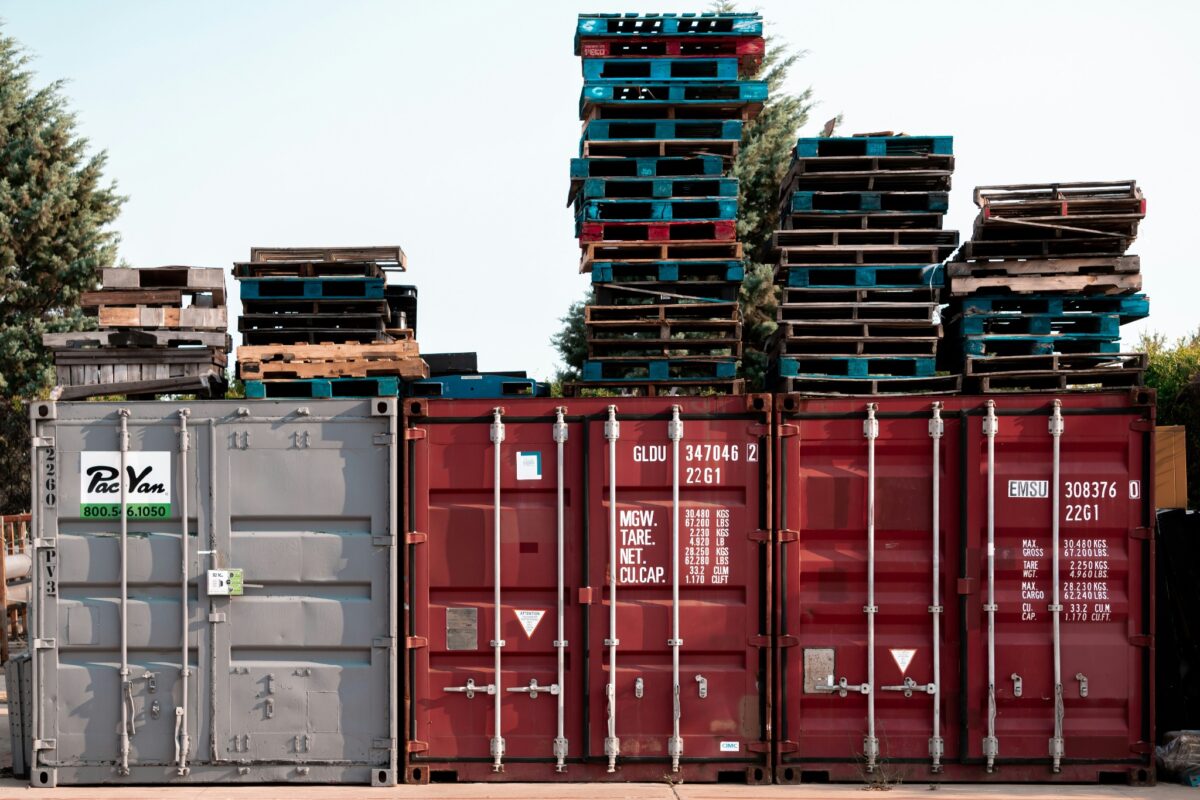In today’s logistics landscape, traceability is more important than ever. Businesses are constantly seeking ways to improve the transparency and security of their supply chains, ensuring that every movement is tracked and accounted for. With the integration of blockchain technology into pallet pooling systems, traceability is being revolutionized, bringing new levels of accuracy, security, and efficiency.
Pallet pooling, where companies share pallets for rent, becomes even more powerful when combined with blockchain. This combination not only optimizes pallet management but also ensures every step of the process is logged and immutable, offering unprecedented visibility for logistics, procurement, and transport professionals.
This article explores how blockchain improves traceability in pallet pooling, the benefits it offers to logistics operations, and how this technology can increase transparency and security in supply chains.
I – Enhanced Traceability and Transparency in Pallet Management
-
Pallet Pooling and Blockchain: Optimal Traceability and Transparent Pallet Tracking
One of the biggest challenges faced by companies using pallets is maintaining accurate and reliable traceability throughout the supply chain. Traditional systems often struggle with manual tracking, lost pallets, and a lack of real-time data, leading to inefficiencies and higher costs. With the integration of blockchain technology, these challenges are addressed head-on, offering a fully transparent and reliable solution for tracking pallets for rent.
Blockchain works by creating a distributed ledger where every transaction or movement is recorded and shared among all participants in the supply chain. Each pallet is assigned a unique identifier that is tracked from the moment it is rented to the time it is returned or reused. This decentralized system ensures that the history of each pallet is immutable and verifiable at every stage, eliminating the risk of errors or lost information.
-
How Blockchain Improves Pallet Tracking
By utilizing blockchain technology, pallet pooling providers can enhance the accuracy and transparency of their systems. Every movement of a pallet is logged in real time, allowing all stakeholders—whether in logistics, procurement, or transport—to see exactly where a pallet is and its condition at any given moment. This level of transparency makes it easier to identify bottlenecks, prevent pallet loss, and improve overall operational efficiency.
Moreover, the blockchain ledger is shared and accessible by all parties involved, ensuring that there is no need for a central authority to verify the accuracy of the information. This trustless system means that every transaction is independently verified and cannot be altered, providing an added layer of security and reliability.
-
Pallets for Rent and Blockchain for Logistics Transparency
Using pallets for rent through a blockchain-powered pallet pooling system provides unparalleled traceability. This is particularly valuable for industries such as retail, manufacturing, and pharmaceuticals, where precise tracking is essential for compliance and efficiency. Blockchain ensures that all pallet movements are captured in real-time, reducing the likelihood of lost pallets and providing companies with better control over their assets.
-
Real-World Example: Reducing Pallet Loss by 20% with Blockchain
Consider the example of a major logistics provider that integrated blockchain with its pallet pooling system. By leveraging blockchain’s traceability capabilities, the company was able to reduce pallet loss by 20%. This improvement came from having real-time visibility into the location of each pallet and the ability to verify every handoff between supply chain partners. As a result, the company not only saved money on pallet replacement costs but also improved the efficiency of its logistics operations.
II – Data Security and Fraud Prevention with Blockchain
-
Securing Logistics Data with Blockchain in Pallet Pooling
In addition to enhanced traceability, one of the most significant advantages of integrating blockchain into pallet pooling is the heightened level of security it provides. In traditional supply chain management systems, data related to pallets can be vulnerable to manipulation, errors, or even fraud. When pallets change hands between suppliers, transporters, and customers, maintaining data integrity can be challenging. Pallets for rent that move across multiple supply chain participants are particularly susceptible to these risks.
Blockchain solves this issue by ensuring that every transaction related to a pallet is recorded on an immutable ledger. This decentralized ledger is distributed across all participants in the supply chain, meaning no single entity has control over the data. As a result, once a pallet’s movement or condition is recorded, it cannot be altered or tampered with. This feature eliminates the risk of fraud and significantly improves data security.
-
How Blockchain Prevents Fraud and Protects Data
The decentralized nature of blockchain ensures that all stakeholders in the pallet pooling system have access to the same set of data. Each movement of a pallet, from the moment it is rented to the moment it is returned or transferred to another party, is documented on the blockchain. These transactions are verified through a consensus mechanism, which guarantees that the information is accurate and cannot be falsified.
This level of security is particularly valuable in industries that require high levels of compliance and data integrity, such as pharmaceuticals, food and beverage, or automotive. For businesses that use pallets, the ability to secure their logistics data through blockchain means that every transaction is trustworthy, reducing the likelihood of fraudulent activities, such as altering delivery records or misreporting pallet conditions.
-
Pallets for Rent with Blockchain for Secure Logistics
By adopting blockchain in the pallets for rent model, companies can significantly reduce their exposure to data breaches and fraud. The blockchain ledger acts as a single source of truth, where all stakeholders can verify pallet transactions without relying on third-party intermediaries. This not only secures the data but also reduces administrative costs related to monitoring and auditing the logistics process.
-
Case Study: A Reduction in Data Errors and Fraud with Blockchain
A global transportation company implemented blockchain technology into its pallet pooling system and saw a dramatic decrease in data discrepancies and fraudulent activities. Before the integration, the company struggled with inconsistencies in pallet returns and frequent billing disputes between suppliers and customers. After adopting blockchain, the company reported a 30% reduction in data errors and a significant drop in fraud attempts. By ensuring that all pallet movements were securely recorded, the company improved transparency across its supply chain, leading to fewer disputes and better operational efficiency.

III – Efficiency and Cost Optimization Through Automation
-
Reducing Costs and Boosting Efficiency with Blockchain and Pallet Pooling
In addition to improving traceability and security, blockchain integration with pallet pooling enhances overall efficiency through automation. The traditional management of pallets often involves manual processes such as tracking movements, verifying transactions, and processing payments. These tasks are not only time-consuming but also prone to errors, leading to inefficiencies and additional costs. With blockchain, these processes can be streamlined and automated using smart contracts, which can drastically improve operational efficiency for companies using pallets for rent.
-
The Role of Smart Contracts in Automating Pallet Transactions
Smart contracts are self-executing contracts with the terms of the agreement written directly into code. In the context of pallet pooling, smart contracts can automate many of the administrative tasks involved in renting and managing pallets. For example, a smart contract could automatically trigger a payment when a pallet is delivered to a designated location or initiate a return process when the pallet is no longer needed. This eliminates the need for manual oversight and ensures that transactions are executed quickly and accurately.
Furthermore, smart contracts provide a clear and auditable trail of every pallet movement and transaction. This not only reduces the administrative burden on logistics teams but also ensures compliance with contractual agreements without the need for third-party intervention.
-
Pallets for Rent and Blockchain for Cost-Effective Logistics
When companies use pallets with blockchain-powered smart contracts, they can optimize their logistics operations and reduce costs. By automating processes such as pallet tracking, payments, and returns, businesses can free up valuable time and resources that would otherwise be spent on manual tasks. The elimination of errors and delays further contributes to cost savings, allowing companies to operate more efficiently.
-
Real-World Example: 25% Cost Reduction Through Blockchain Automation
A large manufacturing company integrated blockchain and smart contracts into its pallet pooling system, which led to a 25% reduction in operational costs. Before the integration, the company struggled with inefficiencies related to manual tracking and payment processing for pallets. With blockchain, the company automated key processes such as tracking, delivery confirmation, and invoicing. This automation reduced the time spent on administrative tasks, eliminated human error, and lowered transaction costs, resulting in significant financial savings.
Conclusion: Pallet Pooling and Blockchain, The Future of Traceability and Efficiency
Blockchain technology, when integrated with pallet pooling, transforms how companies manage their logistics operations. From improving traceability and security to automating transactions and reducing costs, blockchain offers a range of benefits for businesses using pallets for rent. By ensuring real-time visibility, secure data, and efficient operations, blockchain enables companies to optimize their supply chains and reduce operational risks.
As more industries recognize the value of blockchain in pallet pooling, logistics, procurement, and transport professionals should consider adopting this technology to stay competitive and enhance the efficiency of their operations. With blockchain, the future of pallet management is not only more transparent but also more secure and cost-effective.

